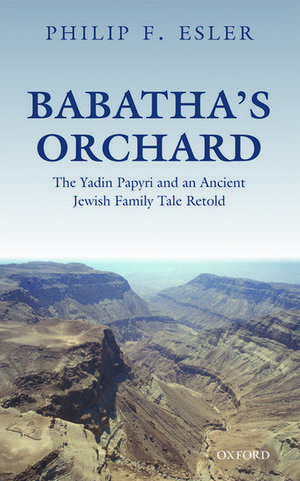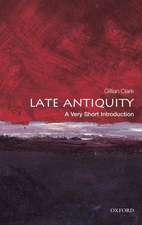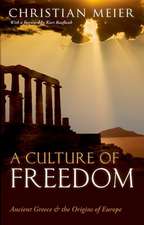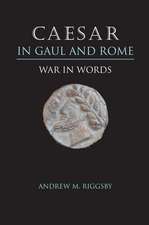Babatha's Orchard: The Yadin Papyri and an Ancient Jewish Family Tale Retold
Autor Philip F. Esleren Limba Engleză Hardback – 23 feb 2017
Preț: 346.34 lei
Preț vechi: 451.20 lei
-23% Nou
Puncte Express: 520
Preț estimativ în valută:
66.27€ • 69.44$ • 54.79£
66.27€ • 69.44$ • 54.79£
Carte tipărită la comandă
Livrare economică 31 martie-07 aprilie
Preluare comenzi: 021 569.72.76
Specificații
ISBN-13: 9780198767169
ISBN-10: 0198767161
Pagini: 302
Ilustrații: 20 Line drawings; 1 Map
Dimensiuni: 141 x 222 x 23 mm
Greutate: 0.48 kg
Editura: OUP OXFORD
Colecția OUP Oxford
Locul publicării:Oxford, United Kingdom
ISBN-10: 0198767161
Pagini: 302
Ilustrații: 20 Line drawings; 1 Map
Dimensiuni: 141 x 222 x 23 mm
Greutate: 0.48 kg
Editura: OUP OXFORD
Colecția OUP Oxford
Locul publicării:Oxford, United Kingdom
Recenzii
[The book] should be read and studied by all students of the Second Revolt and the Bar Kokhba materials, and may it inspire many other such close analyses of the surviving written evidence.
In summary, Esler's study represents true and meaningful progress in our understanding of the long-neglected Nabataean documents from the Babatha archive; this volume confirms that, far from being an already exploited source, the archive still has much to say about the economic, social and cultural history of the apparently marginal territory between southern Judaea and northern Arabia, in a period some decades removed from the Bar Kochba uprising.
It is truly a masterful feat to transform crumbling agricultural receipts into such a vibrant tale. Esler takes the names of sellers, buyers, and guarantors and transforms them into characters from the past. ... Most notably, Esler writes with a refreshing ease accompanying an evocative methodology.
Esler's book has the twists and turns of a detective story, but its biggest surprise is the people into whose world we have been permitted to peer. Women, at least the upper-middle-class Jewish and Nabatean women of Babatha's circle, turn out to have been major financial players in this world. They bought and sold property, financed ventures from which they stood to gain, and even protected their interests at the risk of legal and marital conflict when things did not go according to plan. Babatha's resourceful foresight, together with Philip Esler's lawyerly scholarship, have granted us a glimpse into a fascinating social world that defies our preconceptions and calls out for further study.
Babatha's Orchard is an extraordinary accomplishment. The book has as its focus four legal documents that deal with the sale of an orchard, about as dry as situation as can be imagined, but Philip F. Esler recreates the social and personal circumstances with great imagination and scholarly insight. It is like seeing a tattered black and white photograph turned into a film of the highest quality: what is two dimensional and in poor condition is transformed into a multidimensional narration with many nuances. His book is an inspiring model for scholars, and educated laypeople will find this book an enchanting entryway into a lost world.
In summary, Esler's study represents true and meaningful progress in our understanding of the long-neglected Nabataean documents from the Babatha archive; this volume confirms that, far from being an already exploited source, the archive still has much to say about the economic, social and cultural history of the apparently marginal territory between southern Judaea and northern Arabia, in a period some decades removed from the Bar Kochba uprising.
It is truly a masterful feat to transform crumbling agricultural receipts into such a vibrant tale. Esler takes the names of sellers, buyers, and guarantors and transforms them into characters from the past. ... Most notably, Esler writes with a refreshing ease accompanying an evocative methodology.
Esler's book has the twists and turns of a detective story, but its biggest surprise is the people into whose world we have been permitted to peer. Women, at least the upper-middle-class Jewish and Nabatean women of Babatha's circle, turn out to have been major financial players in this world. They bought and sold property, financed ventures from which they stood to gain, and even protected their interests at the risk of legal and marital conflict when things did not go according to plan. Babatha's resourceful foresight, together with Philip Esler's lawyerly scholarship, have granted us a glimpse into a fascinating social world that defies our preconceptions and calls out for further study.
Babatha's Orchard is an extraordinary accomplishment. The book has as its focus four legal documents that deal with the sale of an orchard, about as dry as situation as can be imagined, but Philip F. Esler recreates the social and personal circumstances with great imagination and scholarly insight. It is like seeing a tattered black and white photograph turned into a film of the highest quality: what is two dimensional and in poor condition is transformed into a multidimensional narration with many nuances. His book is an inspiring model for scholars, and educated laypeople will find this book an enchanting entryway into a lost world.
Notă biografică
Philip F. Esler is Portland Chair of New Testament Studies at the University of Gloucestershire. He is a Higher Education administrator and academic who became the inaugural Chief Executive of the UK's Arts and Humanities Research Council (AHRC) in 2005, remaining in that role until 2009. From 1995 to 2010 he was Professor of Biblical Criticism at St Andrews University. From 1998 to 2001 he was Vice-Principal for Research and Provost of St Leonard's College at St Andrews. During the years 1999 to 2003 he served as a member of the Board of Scottish Enterprise Fife. From October 2010 to March 2013 he was Principal and Professor of Biblical Interpretation at St Mary's University College Twickenham. He had an earlier career as a lawyer, working in Sydney during 1978-81 and 1984-92 as an articled clerk, then solicitor and barrister.

















